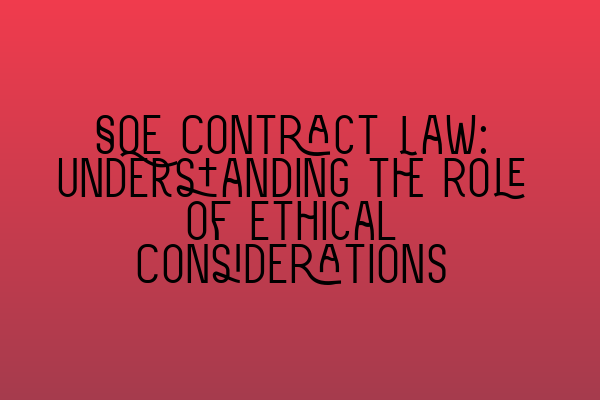SQE Contract Law: Understanding the Role of Ethical Considerations
Welcome to another blog post from SQE Contract Law! Today, we will be diving deep into the world of contract law and exploring the crucial role that ethical considerations play in this field. We will discuss why ethical considerations are important, how they impact contract law, and the implications of ethical breaches. So, let’s get started!
Why Ethical Considerations Matter
Ethical considerations are the moral principles that guide our behavior, decisions, and actions. In the legal profession, they are paramount to ensuring justice, fairness, and integrity. Contract law, in particular, relies heavily on ethical considerations as it governs enforceable agreements between parties.
When professionals in the legal field prioritize ethical considerations, they strengthen the trust and confidence that clients and the public have in the legal system. Additionally, it helps maintain the rule of law, promoting a just and equitable society.
The Impact of Ethical Considerations on Contract Law
In contract law, ethical considerations have a significant impact on the formation, interpretation, and enforcement of contracts. Here are some key points to consider:
1. Formation of Contracts
During the formation of a contract, ethical considerations require solicitors to ensure that all parties have given their voluntary and informed consent. This means that both parties must understand the terms and conditions of the agreement without any undue influence or deception.
By upholding ethical standards during the formation stage, solicitors can prevent disputes and protect the interests of their clients. This is crucial in maintaining a strong legal system that is built on trust and transparency.
2. Interpretation of Contracts
When a contract is ambiguous or open to interpretation, ethical considerations guide solicitors in resolving any contractual disputes. They must interpret the contract in a manner that is fair, reasonable, and aligned with the original intentions of the parties involved.
By staying true to ethical principles, solicitors can ensure that contracts are interpreted in a manner that respects the rights and expectations of all parties. This promotes clarity, consistency, and fairness in the legal system.
3. Enforcement of Contracts
When contracts are breached, ethical considerations play a crucial role in determining the appropriate remedies and ensuring that justice is served. Solicitors must act in the best interest of their clients while also considering the broader implications and societal impact of their actions.
By balancing the interests of their clients with ethical principles, solicitors can seek remedies that are fair, proportionate, and in line with legal obligations. This fosters a sense of accountability and reinforces the integrity of contract law.
The Implications of Ethical Breaches
When ethical considerations are disregarded in contract law, the consequences can be substantial. Ethical breaches can lead to:
- Damage to professional reputation
- Loss of client trust and confidence
- Legal and regulatory repercussions
- Financial losses
- Litigation and disputes
Therefore, it is essential for solicitors to always prioritize ethical considerations in their practice to avoid these negative outcomes.
Conclusion
Understanding and upholding ethical considerations is of utmost importance in the field of contract law. By recognizing the impact of ethical considerations on the formation, interpretation, and enforcement of contracts, solicitors can navigate legal challenges with integrity and professionalism.
If you found this article informative, be sure to check out our related articles:
- Mentorship for Aspiring Solicitors: Nurturing Talent in the Legal Field
- Legal Challenges and Pitfalls: Navigating the Complexities of the Legal System
- Striking a Balance: Work-Life Harmony in the Legal Field
- Demystifying the Solicitors Qualifying Examination (SQE): What You Need to Know
- Embracing Diversity: Advancing Inclusivity in the Legal Profession
We hope you found this article insightful. Stay tuned for more valuable content from SQE Contract Law!
